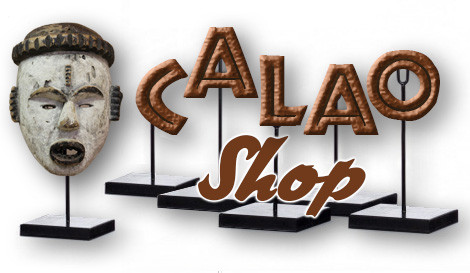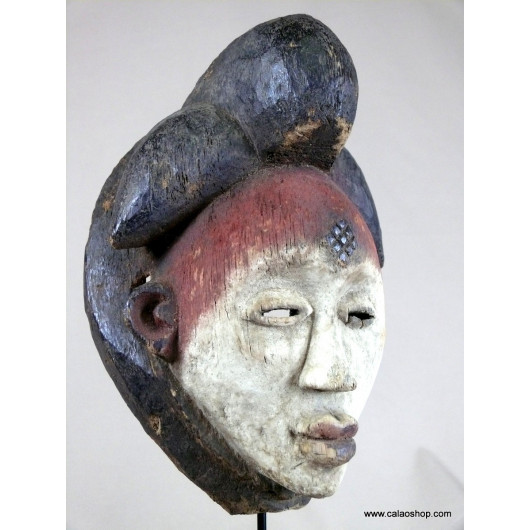Punu mask from Gabon
The two-coloured masks are, according to some African sources, reserved for princes...
-
 Secured payment
Secured payment
-
 Free shipping from 150 €
Free shipping from 150 €
-
 Guarantee "satisfied or refunded"
Guarantee "satisfied or refunded"
beautiful bicolor mask in wood, pigment and kaolin, typical of the ethnic Punu of GaVery bon
Height: 30 cm, width: 20 cm
The white Punu masks
African masks with kaolin-bleached face and black hair in fine braided shell are of a plastic type that can be described as "regional", widespread in a large southern part of the Ogooué basin, in the south of Gabon, and grouped under the generic name "Punu masks".
The white colour of the face is obtained by using a whitish clay called mpemba or pembi. The mpemba is the ritual shade used by all people of Gabon to decorate masks and wooden statues but also and especially to hair face and members of officiants and initiates in all the great collective events that are the birth rites, funeral and mourning, initiations or ceremonies related to bwiti. In the past, in mpemba were mixed with white clay, collected on the banks of streams, bone ashes of the deceased or even, according to some sources, dried flesh powder of stillborn twins.
The white colour, of course, evokes the presence of the sacred in the profane world and the mysterious universe of the deceased and spirits and black shells are the illustration of the sophisticated hairstyles of the women Punu.
The bicolour masks would, according to some African sources, be reserved for princes (The Prince, in Africa, is the chief’s favorite son and thus designated without taking into account, unlike what we have known in Europe, of heredity)
Punu masks are visible symbols in the eyes of villagers of the rites of okuyi - customary dance also known according to regions under the names ocuya, mokoi, moukouji, ikwara, okukwe, mbwanda... - dance linked to the initiatory rites of the mwiri male secret society.
The dancer, whose identity was never to be known by the public, was covered with a wide raffia suit forming a large cape, which was completed by a collar of vegetable fibres and trousers covering the top of the stilts on which he stood, stilts that could reach three meters high. He held in each hand a fly-slinger which he brandished in a threatening manner and was always accompanied by several acolytes ready to intervene in case of imbalance.
The Punu people
The Punu (or Pounou) live in villages divided into clans and families where social cohesion is ensured by the Moukouji society, whose essential role is to subjugate the evil spirits of the forest. During ceremonies related to this society, masks appear, often covered with white pigments... Read more here








